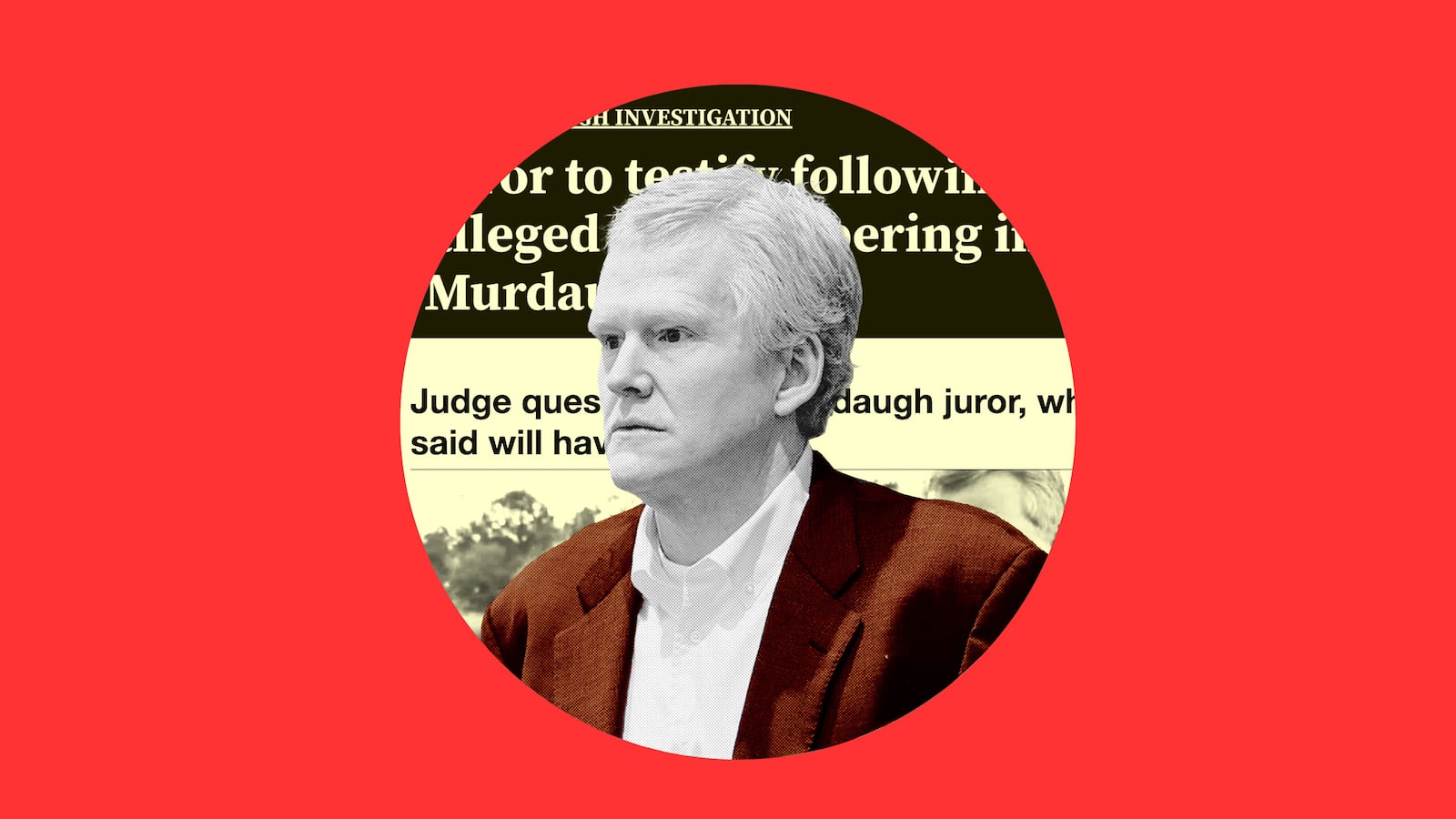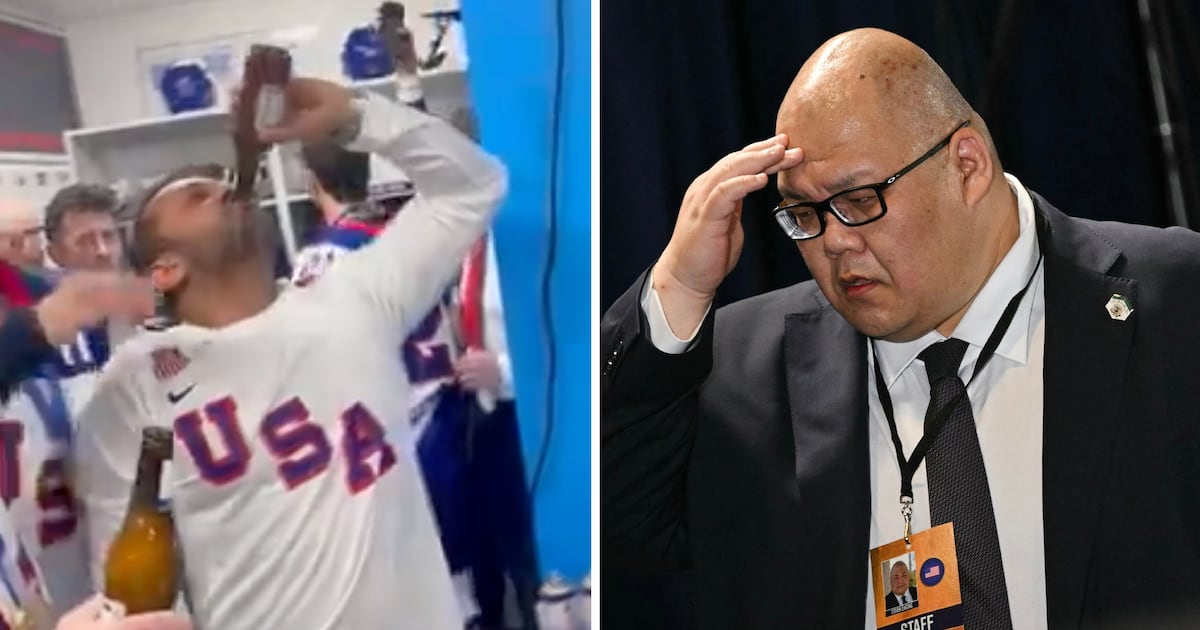The latest plot twist in the Alex Murdaugh saga sounds ripped from a script for Law & Order: A court clerk is accused of convincing the jury in an ex-lawyer’s trial that the ex-lawyer murdered his wife and son, in order to boost sales of the clerk’s upcoming book.
In the fictional prime-time version, of course, the formerly prominent attorney would go free after the clerk breaks down on the stand and confesses her master plan. But real life is rarely that straightforward.
Legal experts consulted by The Daily Beast say Murdaugh’s quest for a new trial faces long odds, even though he won a rare evidentiary hearing to determine if Colleton County court clerk Becky Hill tampered with the jury that found him guilty.
They say that Hill is unlikely to say anything if she is summoned to testify at next week’s hearing, and Murdaugh’s lawyers have a high bar to convince the court that the jury would have acquitted him of double murder if not for Hill’s actions.
“This is going to be an uphill battle for the defense to prove Murdaugh did not get a fair trial, for sure,” Jonathan E.B. Lewis, a South Carolina defense attorney and former prosecutor, told The Daily Beast. “Especially since in South Carolina, we have a legal standard that requires that actual prejudice be proven.”
“Basically, the defense has to show that the jury was influenced—and changed their minds—about the verdict because of [Colleton County Court of Clerk] Becky Hill’s influence during the trial.”
Starting Monday, former state Supreme Court Chief Justice Jean Toal will hear testimony in a three-day hearing to determine if Hill influenced the 12-person jury that found Murdaugh, a once-powerful lawyer, guilty of murdering his wife and son in 2021.
All the jurors and Hill will be called to the stand before Toal, who has been hearing cases in a semi-retired capacity. If Toal decides that Murdaugh was prejudiced because of conduct by Hill, her staff, or the court, then the judge will declare a mistrial and order a new trial, Lewis said.
“It does not go straight to a new trial, however,” Lewis said, adding that the Attorney General’s office would likely appeal the decision and ask for a review of the case by the South Carolina Court of Appeals—and eventually the state Supreme Court if that ruling doesn’t go their way.
“We are years away from a new trial if [Chief Justice] Toal were to even find one was warranted,” he added.
Murdaugh’s lawyers allege that Hill advised jurors not to believe his testimony or evidence, encouraged jurors to render a swift verdict, and had private conversations with the jury foreperson during the six-week February trial. Defense lawyers also argued in a September motion that Hill pushed the jury toward conviction to “secure for herself a book deal and media appearances that would not happen in the event of a mistrial.”
“[Prosecutor Creighton Water] told me this morning that one of the assistants that worked for Hill during the trial was told by Ms. Hill, during the trial, that a guilty verdict would be good for sales for the book,” Murdaugh lawyer Dick Harpootlian said at a Jan. 16 hearing. “Motive: selling books.”
Hill has denied the allegations, and prosecutors contend that the defense has minimal evidence to support their claims that Murdaugh did not receive a fair trial. The allegations, however, have triggered two state probes into Hill: one about her interactions with the jury and another about whether she used her elected position for her own gain. She is also facing an ethics complaint about the alleged misuse of her office and public funds. The sale of Hill’s book, Behind the Doors of Justice, was halted after co-author Neil Gordon accused her of plagiarism.

Alex Murdaugh stands during a break in his trial for murder at the Colleton County Courthouse on Friday, Feb. 24, 2023.
Joshua Boucher/The State/Pool/Tribune News Service via Getty ImagesDayne Phillips, a South Carolina defense attorney who has handled several appellate cases in the state, noted that despite the multiple allegations against the court clerk, Toal is using a high legal standard for the hearing and a limited line of questioning—moves that could hurt Murdaugh’s chances.
“This is an evidentiary hearing on very specific allegations and Toal ruled that she would be the one questioning the jury,” Phillips said.
He said Toal will be using a legal precedent from a 2020 state Supreme Court case that concluded actual prejudice must be proven for a defendant to get a new trial. That ruling means Murdaugh’s lawyers must show that not only did Hill have improper conversations with a jury, but that those jurors were prejudiced in deciding Murdaugh’s fate.
“Prejudice must be proved, not presumed,” Toal said during the Jan. 16 hearing.
Lewis said that in this type of hearing, the burden of proof is on the defense.
“The defense never has to prove a thing until they get to the appellate process. Then, the presumption is that a defendant is rightly convicted and it’s on the defense to prove their client is innocent,” he added.
That threshold may be a little higher, he noted, because Toal ruled that Hill will only be questioned about what happened in the courthouse during the murder trial and her interactions with the jurors.
“This is not the trial of Mrs. Hill,” Toal said. “This is not the time to explore every mistake, incorrect statement, or false statement ever made by this witness.”
Phillips noted that the judge’s ruling on what the defense can ask Hill may not be their biggest setback. It may be the case that Hill may not say much while on the stand. “If I were her lawyer, I would advise her to plead the Fifth,” the lawyer said.
Lewis agrees that Hill will probably invoke her Fifth Amendment right against self-incrimination because she is under investigation in several probes. That said, the lawyer added, the defense’s best strategy may be to just get Hill talking in an attempt to open the door to call other witnesses who could better bolster their argument.
Toal previously denied Murdaugh’s request to call an alternate juror and a dismissed juror, whose written affidavits about Hill’s conduct during the trial are the crux of the defense motion for a new trial. The judge did say Murdaugh’s team can submit a motion to allow evidence to be admitted and that she is open to reconsidering her position during the hearing.
Legal experts said that Murdaugh’s team had already surprised many by getting an evidentiary hearing based on exceptional circumstances—which shows the extraordinary nature of the case.
“We may not see anything like this for a while. A former chief justice is presiding over a case about alleged open misconduct by a public official in a huge murder case,” Lewis said. “I think that no matter the outcome, even when it’s finally done, this case is South Carolina’s OJ. This is going to be talked about for years and years to come.”






